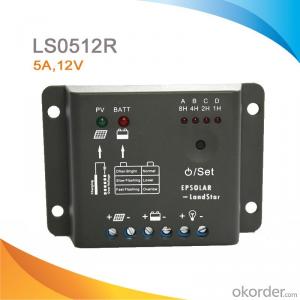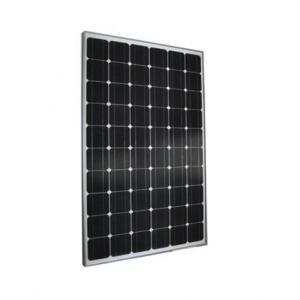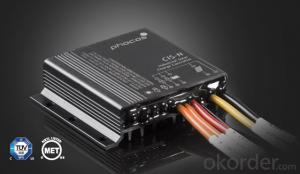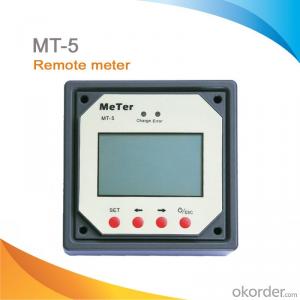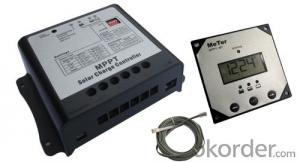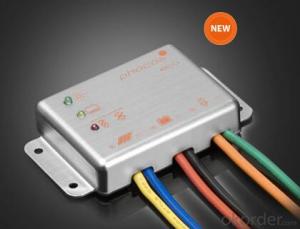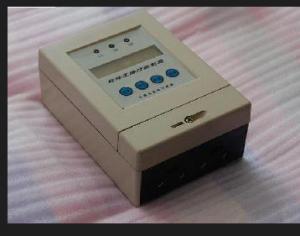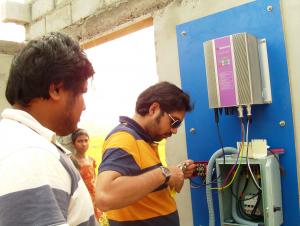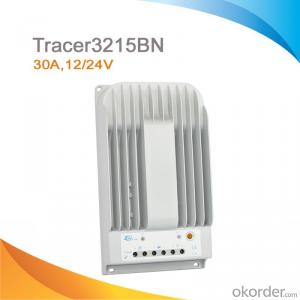PWM Solar Lighting Regulator 5A,12V,LS0512R
- Loading Port:
- China Main Port
- Payment Terms:
- TT or LC
- Min Order Qty:
- -
- Supply Capability:
- -
OKorder Service Pledge
OKorder Financial Service
You Might Also Like
Descriptions
Our solar controllers are designed for solar home system, ideal for rural electrification systems, and many advantages compared to other controllers: Ideal for small off-grid solar lighting system that needs light and timer control.
Features:
·High efficient Series PWM charging, increase the battery lifetime and improve the solar system performance.
·Use MOSFET as electronic switch, without any mechanical switch
·Widely used, automatically recognize day/night.
·Only one key solve all setting simply
·Intelligent timer function with 1-12 hours option
·Adopt temperature compensation, correct the charging and discharging parameters automatically and improve the battery lifetime.
Electronic Protections:
·over charging
·over discharging
·overload
·short circuit
·Reverse protection for battery
Specification:
Electrical parameters | LS0512R |
Nominal System Voltage | 12VDC |
Rated Battery Current | 5A |
Max. Battery Voltage | 16V |
Charge Circuit Voltage Drop | ≤0.26V |
Discharge Circuit Voltage Drop | ≤0.15V |
Self-consumption | ≤6mA |
Overall dimension | 97 x 66x 25mm |
Terminal | 2.5mm2 |
Net weight | 0.05kg |
Working temperature | -35℃ to +55℃ |
Humidity | 10%-90% NC |
Enclosure | IP30 |
Battery Voltage Parameters (temperature at 25℃) | |
Battery charging setting | Sealed |
Equalize Charging Voltage | 14.6V |
Boost Charging Voltage | 14.4V |
Float Charging Voltage | 13.8V |
Low Voltage Reconnect Voltage | 12.6V |
Low Voltage Disconnect Voltage | 11.1V |
Equalize Duration | 2 hours |
Boost Duration | 2 hours |
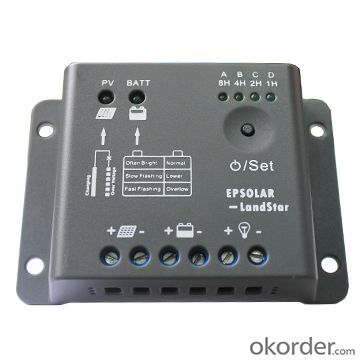
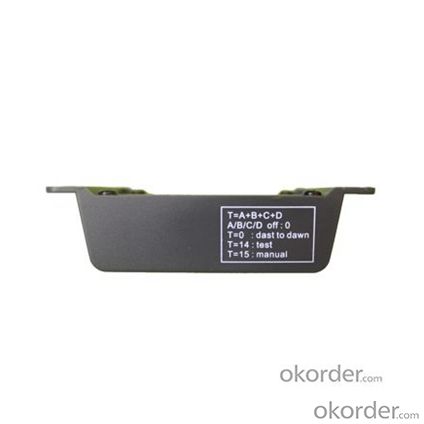
- Q:How does a solar controller prevent damage from over-discharging of batteries?
- A solar controller prevents damage from over-discharging of batteries by continuously monitoring the battery voltage and automatically disconnecting the load when the voltage drops below a certain threshold. This prevents the batteries from being drained beyond their safe operating range, preserving their lifespan and preventing irreversible damage.
- Q:Can a solar controller be used with solar-powered indoor air purification systems?
- Yes, a solar controller can be used with solar-powered indoor air purification systems. A solar controller helps regulate and optimize the charging and discharging of battery systems connected to solar panels. By utilizing a solar controller, the solar-powered indoor air purification system can effectively manage and store the solar energy generated, ensuring continuous and efficient operation.
- Q:Can a solar controller be used with solar panels of different ages?
- Yes, a solar controller can be used with solar panels of different ages. The controller's main function is to regulate and optimize the charging process of the battery by managing the flow of electricity from the solar panels. As long as the solar panels are compatible with the controller's voltage and current ratings, their age should not affect the controller's performance.
- Q:How does a solar controller handle battery under-voltage protection?
- A solar controller handles battery under-voltage protection by continuously monitoring the voltage level of the battery. If the voltage drops below a certain threshold, indicating that the battery is being discharged too much, the controller will automatically disconnect the solar panels from the battery to prevent further depletion. This protects the battery from irreversible damage and prolongs its lifespan.
- Q:What is the maximum load current a solar controller can handle?
- The maximum load current a solar controller can handle varies depending on the specific model and its design specifications. It is important to consult the manufacturer's documentation or specifications sheet for accurate information on the maximum load current capacity of a particular solar controller.
- Q:Can a solar controller be used with solar-powered remote weather stations?
- Yes, a solar controller can be used with solar-powered remote weather stations. A solar controller is designed to regulate the charging and discharging of batteries in a solar power system. Remote weather stations that are powered by solar panels often use batteries to store the energy generated by the panels. In order to ensure the batteries are charged properly and protected from overcharging or deep discharging, a solar controller is used. The solar controller will monitor the voltage and current from the solar panels and adjust the charging process accordingly. This helps to maximize the efficiency and lifespan of the batteries, ensuring reliable power supply for the remote weather station.
- Q:Do solar controllers require any maintenance?
- Yes, solar controllers require regular maintenance. This typically includes cleaning the controller's surface, checking and tightening any loose connections, inspecting the wiring and cables for any damage, and ensuring proper ventilation for efficient operation. Additionally, it is recommended to monitor the controller's performance and battery health regularly to ensure optimal functionality and longevity.
- Q:What is the purpose of the low voltage disconnect feature on a solar controller?
- In order to safeguard the batteries from over-discharge, the low voltage disconnect feature on a solar controller serves a crucial purpose. When the battery's voltage drops below a certain level, irreversible damage can occur, significantly reducing its lifespan. By monitoring the battery voltage, the low voltage disconnect feature effectively disconnects any load, such as appliances or devices, from the battery once the voltage falls below a predetermined threshold. This action prevents excessive drainage of the battery, ensuring that it retains a sufficient charge for proper functioning and longevity. Consequently, by disconnecting the load, the low voltage disconnect feature plays a vital role in protecting and optimizing the battery's performance within a solar power system.
- Q:How does a solar controller handle power fluctuations in the system?
- A solar controller handles power fluctuations in the system by regulating the flow of electricity between the solar panels and the battery bank. It continuously monitors the voltage and current levels, and if there are any fluctuations, it adjusts the charging or discharging rate accordingly to maintain a stable power output. This helps to protect the system from overcharging, over-discharging, and other potential damages caused by power irregularities.
- Q:How does a solar controller handle the protection against battery reverse discharge?
- A solar controller handles the protection against battery reverse discharge by incorporating a built-in battery reverse discharge protection circuit. This circuit ensures that the current from the battery does not flow back into the solar panels during low or no sunlight conditions, preventing damage to the battery.
1. Manufacturer Overview |
|
|---|---|
| Location | |
| Year Established | |
| Annual Output Value | |
| Main Markets | |
| Company Certifications | |
2. Manufacturer Certificates |
|
|---|---|
| a) Certification Name | |
| Range | |
| Reference | |
| Validity Period | |
3. Manufacturer Capability |
|
|---|---|
| a)Trade Capacity | |
| Nearest Port | |
| Export Percentage | |
| No.of Employees in Trade Department | |
| Language Spoken: | |
| b)Factory Information | |
| Factory Size: | |
| No. of Production Lines | |
| Contract Manufacturing | |
| Product Price Range | |
Send your message to us
PWM Solar Lighting Regulator 5A,12V,LS0512R
- Loading Port:
- China Main Port
- Payment Terms:
- TT or LC
- Min Order Qty:
- -
- Supply Capability:
- -
OKorder Service Pledge
OKorder Financial Service
Similar products
New products
Hot products
Related keywords
